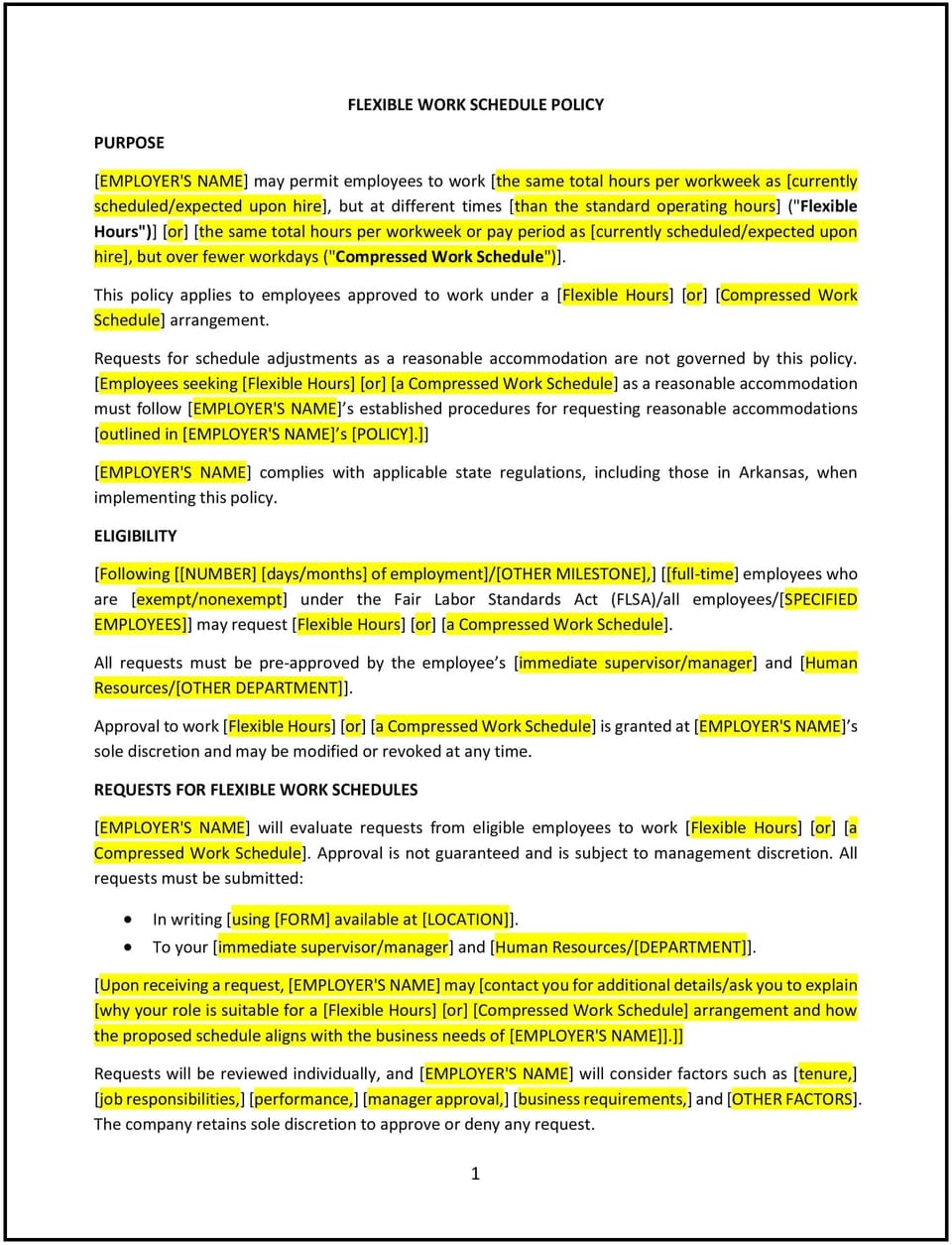Flexible work schedule policy (Arkansas): Free template

Flexible work schedule policy (Arkansas)
In Arkansas, a flexible work schedule policy provides employees with options to adjust their working hours to better balance personal responsibilities and workplace commitments. This policy supports productivity and morale by accommodating diverse needs while maintaining business efficiency and compliance with labor laws.
This policy outlines eligibility criteria, the process for requesting flexible schedules, and expectations for communication and accountability. By implementing this policy, Arkansas businesses can enhance employee satisfaction, attract top talent, and ensure compliance with applicable regulations.
How to use this flexible work schedule policy (Arkansas)
- Define eligibility: Clearly outline which employees or roles qualify for flexible work arrangements, considering job requirements and business needs.
- Set schedule options: Provide examples of flexible arrangements, such as compressed workweeks, remote work, or staggered hours.
- Establish request procedures: Outline the process for employees to request a flexible schedule, including required documentation or proposals.
- Communicate expectations: Clarify how employees will track their hours, meet performance goals, and remain accessible during agreed-upon times.
- Monitor effectiveness: Regularly review the impact of flexible arrangements on productivity and operations to ensure continued alignment with business objectives.
Benefits of using this flexible work schedule policy (Arkansas)
This policy offers several advantages for Arkansas businesses:
- Enhances employee retention: Demonstrates the business’s commitment to supporting work-life balance, fostering loyalty and reducing turnover.
- Improves productivity: Allows employees to work during their most productive hours, increasing efficiency and focus.
- Attracts top talent: Positions the business as an employer of choice by offering flexible arrangements that appeal to a diverse workforce.
- Supports compliance: Aligns with Arkansas labor laws regarding work hours, overtime, and employee rights.
- Promotes workplace morale: Creates a supportive environment that values employee needs and contributions.
Tips for using this flexible work schedule policy (Arkansas)
- Address Arkansas-specific considerations: Ensure compliance with state labor laws, such as overtime regulations, when implementing flexible arrangements.
- Train managers: Provide training on managing and evaluating flexible schedules to ensure consistency and fairness.
- Use technology: Leverage tools like time-tracking software or communication platforms to monitor productivity and facilitate collaboration.
- Communicate clearly: Ensure employees understand their responsibilities, including meeting deadlines, attending required meetings, and maintaining availability during core hours.
- Review regularly: Periodically assess the policy to reflect changes in workplace needs, technology, or employee feedback.
Q: How does this policy benefit the business?
A: This policy enhances employee satisfaction, improves productivity, and attracts top talent while ensuring compliance with Arkansas labor laws.
Q: What types of flexible work arrangements are available?
A: Options may include remote work, staggered hours, compressed workweeks, or other schedules that align with business needs and employee preferences.
Q: How does this policy support compliance with Arkansas laws?
A: The policy adheres to state labor laws regarding work hours, overtime, and employee rights, ensuring fair and lawful implementation.
Q: What steps should the business take to approve flexible work schedules?
A: The business should review employee requests, assess operational feasibility, and document approved arrangements to ensure clarity and accountability.
Q: How can the business monitor the success of flexible work arrangements?
A: The business can track performance metrics, gather employee feedback, and conduct periodic reviews to ensure flexible schedules are meeting both employee and business goals.
This article contains general legal information and does not contain legal advice. Cobrief is not a law firm or a substitute for an attorney or law firm. The law is complex and changes often. For legal advice, please ask a lawyer.


